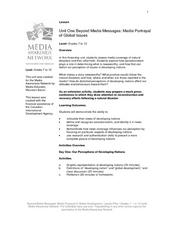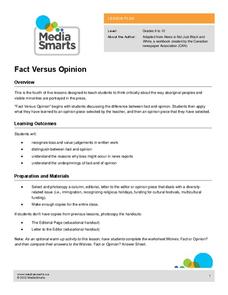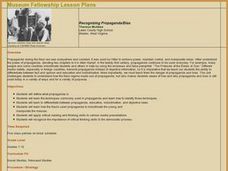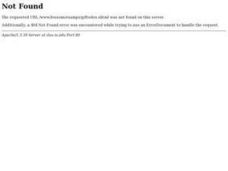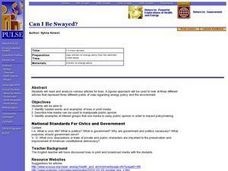Curated OER
Bias and Crime in Media
Critical thinking and social justice are central themes for this resource on bias and crime in media. The class views and discusses an incisive PSA that highlights assumptions based on race. Small groups read newspaper opinion pieces...
Brown University
Analyzing the News
With so many ways to follow the news today, it is imperative to think critically about the sources of information we are turning to. Here is a fantastic graphic organizer that will help your learners develop the skills to properly...
Facing History and Ourselves
Citizen Watchdogs and the News
To conclude their case study of media coverage of the shooting of Michael Brown by a Ferguson, Missouri, police officer, class members consider the role of citizen watchdogs in a democratic society, develop strategies for combating...
Museum of Tolerance
Influence of Media
We are bombarded with media images expressly designed to influence viewers. Learning how to analyze the intended effects of these images is essential and the focus of an activity that asks viewers to use the provided questions to guide...
Museum of Tolerance
Developing Media Literacy
To protect young people from questionable content, many schools limit access. This resource suggests that because learners can so readily avail themselves to unrestricted Internet access, it is vital for 21st century learners to develop...
Facing History and Ourselves
How Journalists Minimize Bias
Class members are challenged to write a neutral news story about the events they observe in a short video. After sharing their stories in groups and discussing the different perceptions, the class concludes with a video of journalists...
Curated OER
Beyond Media Messages: Media Portrayal of Global Issues
Take a close look at news reporting techniques and global issues. Begin by creating a graphic representation of developing nations and defining the term. After class discussion, the second day's activities pick up by deconstructing news...
iCivics
Propaganda: What’s the Message?
As class members progress through eight fully prepared learning stations, they will identify how bias is present in persuasive media, as well as differentiate among types of propaganda techniques like bandwagon propaganda and the use of...
Curated OER
How Media Shapes Perception
Students explain the impact that the media may have in shaping their intellectual and emotional responses to current events. They examine broadcast and Web-based news sites to find subtexts through the use of language, audio, and visual...
Brown University
Following the U.S. Presidential Election
Election years provide the opportunity to evaluate news media as well as the next prospective president. High schoolers read about the same event in several different news sources, varying in type, origin, and political leaning, before...
Media Smarts
Fact versus Opinion
Part of a series aimed at breaking down cultural bias from the Canadian Media Awareness Network, this activity identifies where opinions do and don't belong in a newspaper. Pupils review handouts about the purpose of editorial comments...
Curated OER
First Nations in the Media
Learners analyze the portrayal of Aboriginal people in the media. In this stereotype identification lesson, students investigate the ways the media represents Aboriginal culture. Learners use the Internet to research, and present their...
Curated OER
Recognizing Propaganda/Bias
Middle and high schoolers examine the uses of propaganda during the Nazi era. Using examples of propaganda used by Hitler, they discuss how it changed the thinking and ideas of people exposed to it. In groups, they identify how and why...
Curated OER
Sex Stereotypes in Society
Students analyze a collection of advertisements or photographs in a text or magazine and identify the stereotypes used or possible biases of the editors. They discuss how these stereotypes are formed, and the ways in which they impact...
Teaching Tolerance
Using Photographs to Teach Social Justice | Exposing Gender Bias
Young sociologists are asked to read two photographs, identifying how the photographer uses point of view, color, pose, light, and shadow to express a stereotype of women or to challenge those stereotypes. Partners then create their own...
Curated OER
Exploring Media: Understanding and Identifying Editorial Perspective in Television and Radio News
Students research the topics Boat People: A Refugee Crisis, Dr. Henry Morgentaler: Fighting Canada's Abortion Laws, and CANDU: The Canadian Nuclear Reactor on the CBC Radio and Television Archives Web site.
Media Education Lab
Propaganda Techniques
In an age of fake news, alternative facts, and biased reporting, it is more important than ever that 21st century learners develop the critical-thinking skills necessary to recognize, analyze and resist the propaganda techniques used in...
Committee for Children
Students Learn to Stop Rumors Before They Start
Two activities look at how rumors are spread and ways class members can stop them. The first activity brings forth an in-depth conversation about how reporters gather information to write articles and how students can implement the same...
Curated OER
The Influence of Media on Decision Making: Exploring Ideas of Bias in Media with a Committee of the Legislative Assembly
Eleventh graders participate in a role play about the Legislative Assembly of British Columbia. They write an essay evaluating the influence (if any) the media has on decision-making.
Curated OER
Looking for Trouble - Using the Internet to Research Structured Controversy
Discuss controversial issues with your charges. More importantly, discuss how you have to research both sides of a controversy before taking a stance. In groups, middle schoolers research the controversial issue of dog sled racing. They...
Curated OER
Not Getting the News about the Stamp Act
How did American colonists react to the Stamp Act of 1765? Your young historians will examine primary source material by reading excerpts from a transcription of the Pennsylvania Gazette and then identifying the sentiments expressed by...
Curated OER
Can I Be Swayed?
Students identify loaded words and examples of bias in print media. They describe how media can be used to manipulate public opinion. Students identify examples of interest groups that use media to sway public opinion in order to impact...
Stanford University
Vicksburg
Long before the term fake news, media outlets offered competing narratives of events at the time. Looking at newspaper reports from the Battle of Vicksburg, class members consider two different versions of the strategic siege—one from...
Curated OER
Quality of Information: Point of View and Bias
Fifth graders identify stereotypes of Indian people based on perceived characteristics. They discuss the misconceptions. Students define quality of information and give an example from the story "Seaman's Journal: On The Trail With Lewis...








